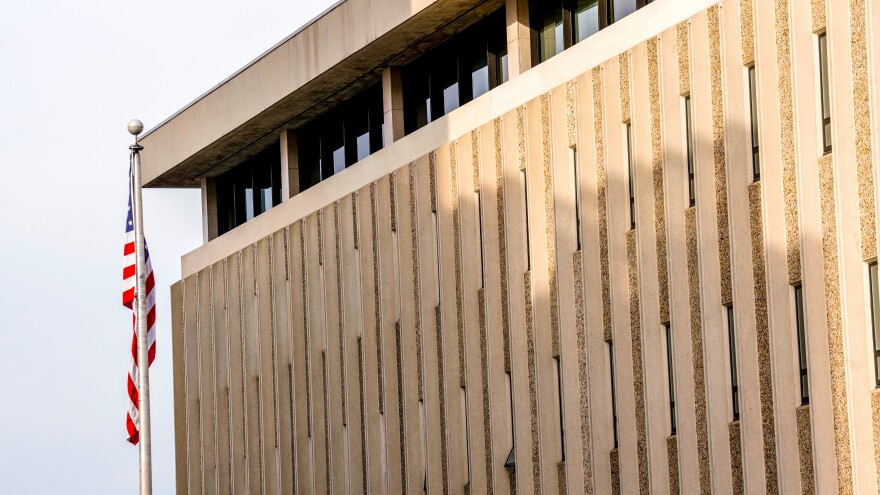- Allentown City Council approved an amended budget on Saturday following a three-hour meeting
- There's no tax increase involved, though Mayor Tuerk had proposed one in previous budget discussions
- The city will be allocating millions in ARPA funds for a community center and "deeply affordable" housing
ALLENTOWN, Pa. — After more than a three-hour meeting Saturday morning, Allentown City Council eventually agreed on a budget plan featuring no increase in taxes currently facing residents.
Mayor Matt Tuerk had previously shared an initial budget proposal of about $147 million in general funding based around a 6.9% tax increase, equaling out to roughly $53 per household in additional expenses over the course of the year. The entire budget made note of a total $229 million.
Before Saturday’s vote, he and his administration made some adjustments and provided an alternative funding cuts plan that would’ve saved the city a total of $752,158, representing a 4.57%, or .33 mills, increase instead of the initial option.
The council ended up voting 5-2 in favor of an amended version of the proposed budget, with councilmembers Candida Affa and Santo Napoli in support of the tax increase and ultimately voting in opposition.
Council commentary
“It’s either give less or charge a little more,” councilmember Santo Napoli said. “And that’s really where we’re at here with this conversation.”
He said not approving the tax increase would be “hamstringing” specific city employees, though he understood where citizens’ concerns came from.
Councilmember Ce-Ce Gerlach said a couple of bucks a month might not seem like much to some people, but there’s other residents “who are literally surviving on 50 cents to their name for a month.”
“These are realities that people in Allentown are facing on a day-to-day basis,” said. “We are choosing between tuna fish, gas and formula for kids.”
Councilmember Candida Affa was one of two in support of the tax increase, referring to a time she said the city had to raise taxes at 27% after 13 years with no bump. Affa said the city would be hit by an increase out of left field eventually, and that’d hurt even more than this proposal.
“These are realities that people in Allentown are facing on a day-to-day basis. We are choosing between tuna fish, gas and formula for kids.”Allentown City Council member Ce-Ce Gerlach
“If we don’t raise it now, Ms. Gerlach, do you want to raise it next year? The year after?” Affa asked. “These are services that we must have.”
Council Vice President Cynthia Mota said “the community is suffering” and is not in a position for a tax increase, as citizens’ wages have not increased by and large.
Councilmember Ed Zucal said the city’s five-year plan already calls for a tax increase in 2026, and the citizens “can no longer afford to take the responsibility.”
Council President Daryl Hendricks said he’s seen “too many people hurting,” and he couldn’t agree to vote in favor of a tax increase.
Mayor Matt Tuerk said no one in the city government wants to raise taxes, but it’s due time.
“We’re asking you to do this because the city needs it; it’s us doing good by the residents.”Allentown Mayor Matt Tuerk
“It takes courage to do it,” Tuerk said. “No mayor wants to stand in front of residents, visit them at their doors, see them in the street, meet with them in the lobby at City Hall, meet with them in council chambers and say that ‘I’m proposing to raise taxes.’
“We’re asking you to do this because the city needs it; it’s us doing good by the residents.”
In addition to the approval and instead of the proposed $120 increase to the annual rate for trash and recycling collection services, the panel and administration agreed to a $40 increase.
Tuerk said this number would keep the recycling and solid waste fund “solvent” through 2024, causing a minimum impact on residents.
Another amendment included adding one new telecom technician position in the police department, 12 new firefighters, a financial analyst and a sweep officer in Solid Waste.
ARPA possibilities
Local nonprofit leadership earlier this week had voiced their concerns about the city’s potential use of American Rescue Plan funding.
The city had received $57 million, but had planned to set aside $10 million for other projects.
Community Action Lehigh Valley, a local anti-poverty nonprofit, had requested the city consider investing in a future youth center. The nonprofit was seeking $1.85 million to demolish the old Cleveland School on North Ninth Street in the first steps of the project.
Ripple, a local anti-homelessness initiative, had pitched the idea of the city helping to make its plans a reality, of turning the Emmanuel United Church of Christ into “deeply affordable” housing. Its director in October had asked council for $1.5 million for the project.
The mayor previously had proposed to use the $10 million for updating the police and fire stations.
Affa, who previously wanted full, required funding for these public safety improvements, eventually agreed with council to approve $9 million to be allocated for those projects.
The council also allocated $1 million to Ripple, $1 million to Community Action Lehigh Valley and $1.2 million to be placed in a community recovery fund for area nonprofits. The city’s community and economic development officials will be planning how to divvy out that money.
Emergency services viewpoint
No new police officers were included in the proposed budget, but $800,000 is placed toward salary increases for current employees of the department.
Police Chief Charles Roca said, in his mind, the proposed budget “aligns itself with ‘defunding the police’ by removing valuable overtime dollars.”
The chief is seeking $48.7 million for his department in 2024, which is nearly a 6% increase from initial budgets from 2023.
He said bringing in more money for the collective bargaining members is good, but he doesn’t want his management to feel left out, get other jobs and create a “void of leadership” in the department.
Thanks to help from his staff, overall crime in the city is down 18.8% as compared to 2022, as well as down 5.8% in violent crime as part of a three-year average, Roca said.
“That takes boots-on-the-ground policing, that takes command oversight, that takes of what we are trying to achieve in the city of Allentown Police Department, which is to empower our commanders,” Roca said.
Hendricks, at one point, said the council is always welcome to come back together to discuss further amendments.


